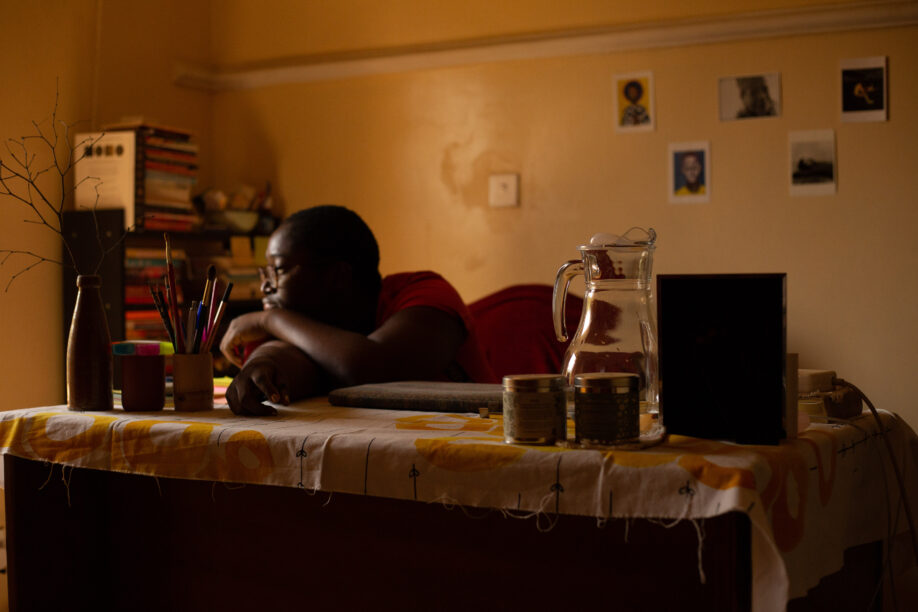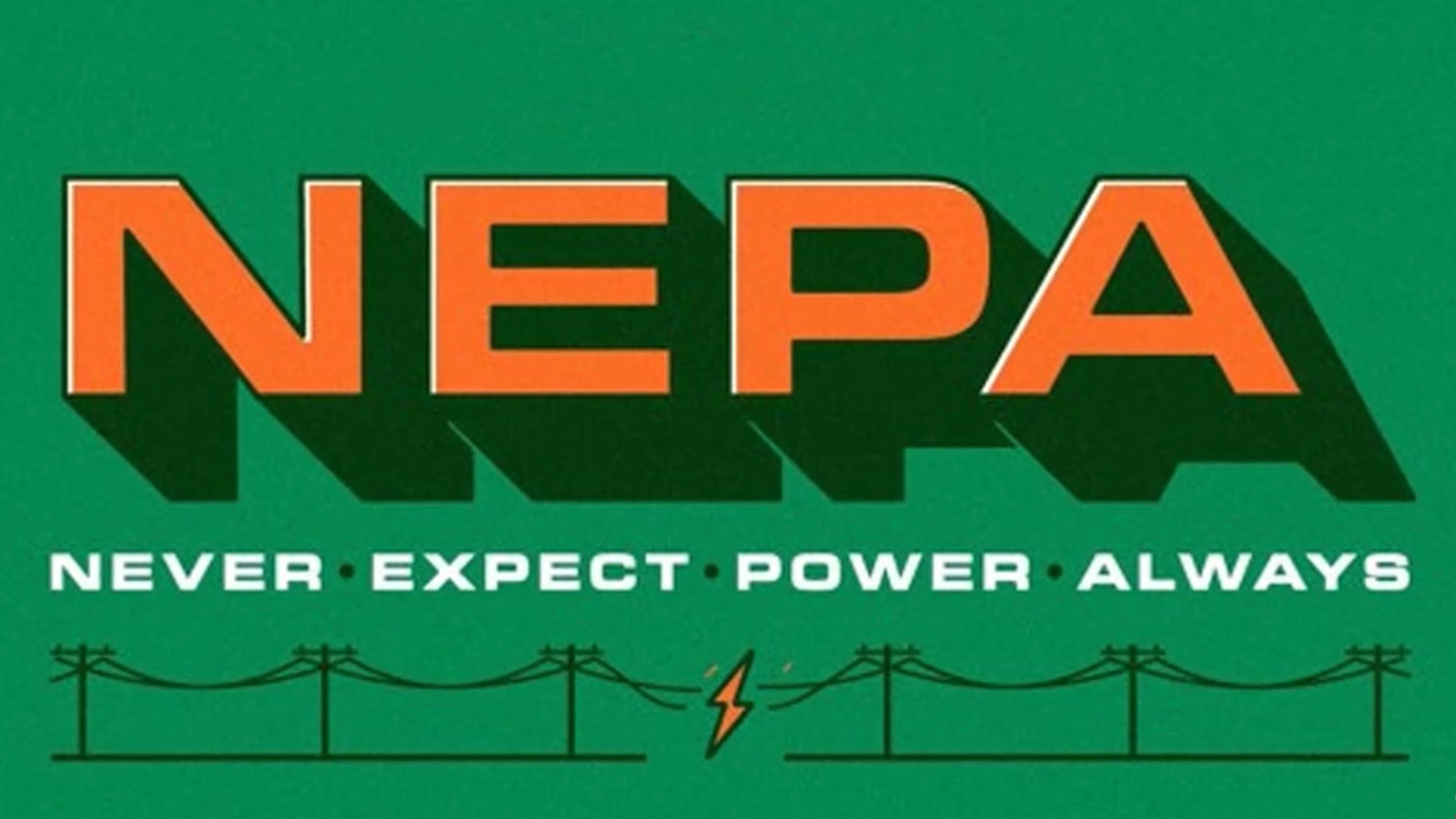During my lunch break yesterday I told my friend Kamnelechukwu, an artist based in Lagos, that I was writing an article on Nigeria’s infrastructure failures, and how we cope with them individually.
“Would you say the general light situation affects your mental health or well-being?” I asked.
“Where do I even start?” she replied, laughing. “When I moved to Lagos, I did not have a lot of money. On one of those early days, I had gone to the market and bought food with the last I had, cooked the food and put it in the fridge for the next few days, only for them to take the light. The first day I thought oh, surely, they will bring the light later, and I continued thinking like that, until all the food spoiled.
“I felt… it’s not even sadness, I wish it was sadness. I felt like I should just drop out of my body, because you know, when you have to now start eating food not because you want to eat, but just because it is spoiling; and so it doesn’t spoil, you finish.”
 photo courtesy of the author
photo courtesy of the authorIn May, my neighbourhood in Abuja did not have light for 10 days straight. By day five, all my food had gone bad, and I was sending my third apology for missing a work deadline, since I’d had to run around town looking for affordable means of charging my phone and laptop. I went to sleep each night in tears, or near tears, from the sheer frustration and heat of the day.
Forty-three percent of Nigerians—that’s eighty-five million people—lack access to electricity via the national grid. But even for those with access, the unreliable and poor power supply results in per capita energy consumption of 113kWh in an entire year. (Compare this with Brazil, which has a comparable population, and energy consumption of 2405kWh per capita annually; for India, with almost seven times Nigeria’s population, the figure is 857kWh.) The insidious consequences of energy poverty on Nigerians’ mental health and well-being are an overlooked drain on our society.
The tension between what life in Nigeria demands and what resources the country gives its people may be unique to Nigeria, but other parts of the world are experiencing similarly devastating consequences of energy deprivation.
In a 2016 study on the social impact of Hurricane Sandy in New York, researcher Shao Lin and her team at the University of Albany found that the areas that had experienced extended blackouts and disruptions to public transportation and health care saw a significant increase in emergency room visits for substance abuse problems, psychosis, mood disorders and suicides.
Similarly, Michael Adu Okyere and Boqiang Lin at Xiamen University, China, found in a 2020 study on Ghanaians that a rise in energy deprivation increased the odds of suffering depression. They concluded their research by “urging policymakers to adopt a holistic approach, where simultaneous attention is given to all the dimensions of energy poverty since they collectively have detrimental effects on mental health.”
In colloquial Nigerian, we do not speak of ‘blackouts’, ‘power cuts’ or ‘load-shedding’. We generally simply say: “There is no light.” And we mean light as in ‘to make things visible’, light as in relief from a burden, light as energy and light as power, all at once. All the connotations of ‘light’ combine to draw a fuller picture of the multiple dimensions of energy poverty.
One day in 2020, Afolabi, a policy research analyst in Abuja who lives with asthma, started wheezing and could not find his nebuliser or inhaler. There had been no light in his neighbourhood for a couple of days, and even his inverter for backup power had run out of charge. “I was woken up by the wheezing and my phone battery was dead, so I was stranded,” he said, adding, “these days, I arrange for the possibility. I have inhalers everywhere. I’m conditioned to it now.”
Light as in relief from a burden is how most Nigerians feel when they move to other countries. It is this light we are drip-fed and excessively grateful for. “Walking down the street I’d hear that siren alarm that lets you know they’ve just brought light, and I’d hear shouts of joy in the background, ‘Up NEPA! Up NEPA!’” my friend Immaculata M. told me.*
Before she left Nigeria, her decisions and plans revolved around whether or not there would be light, even with respect to her long-distance relationship. “I’d have to explain to my partner that my battery has been dead. You can’t just talk any time you want, because you have to be mindful of your battery,” she said. “I could do only quick checkups on my socials—reply to what I could, and leave the rest, just because I didn’t want to start a conversation I might not be able to continue.”
J., a Ghanaian who has lived in Ibadan for the past few months, finds that he has to ration his mental energy for day-to-day affairs due to the poor electricity supply.
“After over 24 hours of blackout, today we are blessed with low current, which can neither pump water nor keep the fridge running. So now we are here, out of water, and our food has already started going bad, and I fear the refrigerator’s motor may have been impacted and may need to be fixed. How about that! Whatever courage or motivation I mustered has been dashed this morning.”
“E fit just kill your mood,” my friend Effiom told me. “Especially when you know you have things to do, you’ll just be wondering, mehn, if I was in another country, I can just go far,” he said.
Effiom’s business and social life revolve around hosting events for friends and communities. “I stopped hosting parties because of the inconsistency of light in my new flat,” he told me. For him, the challenge of poor electricity is the only thing that pushes him to consider joining Nigeria’s fourth ‘japa wave,’ the trend of young Nigerians leaving the country in search of a better quality of life.
With the recent rise in the cost of living, alternative power sources such as generators and inverters have become too expensive. Generators rely on fuel whose price has tripled over the past month, due to the removal of a decades-long fuel subsidy.
“The annoying thing is that talking about it doesn’t feel like it necessarily creates any change,” Immaculata M. concluded in a note to me. “We just keep talking, talking, talking our way through the challenge, the depression, the trauma, and Nigeria continues to be Nigeria.”
*NEPA is the acronym for the National Electric Power Authority, which was changed to Power Holding Company of Nigeria (PHCN) in 2005, and later privatised and broken into six power companies, eleven distribution companies and one transmission company. Colloquially, though, the Nigerian public continues to refer to NEPA more than it does to PHCN or the local distribution companies. And because power outages have become the norm rather than the exception, these acronyms are often translated to “Never Expect Power Always” (NEPA), “No Electrical Power at All; Please Light Candle” (NEPA plc), or “Please Hold a Candle Now” (PHCN).






